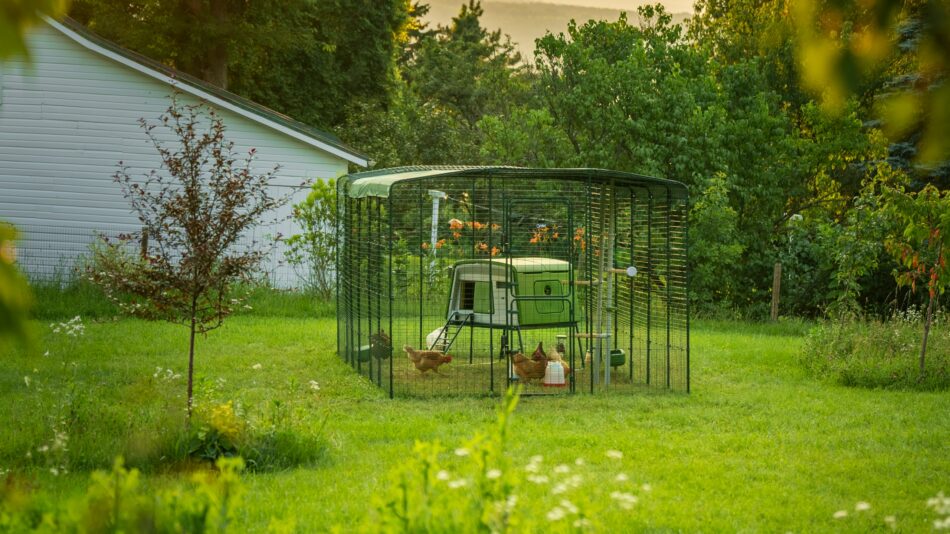Top tips for expanding your flock
Keeping a flock of chickens can be a leisurely pastime, with the potential for just enough challenge to keep things interesting. What starts as a handful of hens quickly becomes a growing fascination, and before long you’ll be wondering when it’s time to welcome a few more feathered friends. Knowing the top tips for expanding your flock will help you do it successfully. Here’s how to keep your current hens happy while making the newcomers feel at home.
Step 1: assess your current setup
Before you bring home more chickens, you’ll need to evaluate your existing space and setup. Overcrowding is one of the quickest ways to stress a flock, causing aggression, feather pecking, and poor egg production.
Here are some things to consider:
- Space requirements — More space is always better, especially for larger or more active breeds. Make sure your coop can accommodate more chickens based on its rating. Omlet chicken coops come in 3 sizes to accommodate a variety of flocks.
- Nesting boxes — As a rule of thumb, you’ll want to provide 1 nesting box for every 3-4 hens. If your current setup won’t support new flock members, you’ll need to add more before expanding.
- Perching and enrichment — Variety is the spice of life for chickens. Make sure you have plenty of perches at various heights, chicken dust baths, and enough chicken feeders and waterers to avoid competition.
If your setup is already at capacity for your flock, upgrading to a larger coop or extending your chicken run will make expansion much easier.
Is there room for more personality?
Physical space isn’t the only consideration. Chickens, like other pets, have their own set of temperaments. Some hens are calm and cohesive, while others thrive on drama. Consider how your current group interacts before adding new personalities into the mix.
Safe introductions: understanding the pecking order
Chickens live by a social hierarchy known as the pecking order. Every hen knows their place, and new arrivals inevitably (but temporarily) disrupt that balance. It’s natural for existing flock members to peck at newcomers to establish dominance, but your aim is to keep it fair, not fierce.
The gradual introduction method
The best way to integrate hens is slowly. Patience is key, and full, successful integration can take anywhere from a few days to a few weeks depending on the temperaments at play. Here are steps to gradually introduce new flock members:
- Separate but visible. Keep new chickens in their own secure space, ideally in a secondary coop and run, where they can see but not touch the established flock.
- Supervised mingling. After 1-2 weeks of adjacent accommodations, let the groups meet under supervision in a neutral space. Short sessions are key to prevent tension.
- Monitored behaviour. Once you’ve fully integrated the two groups, you can expect some pecking and posturing. Step in if you see persistent bullying, excessive feather pulling, or injury.
Always complete a period of quarantine for new flock members far away from your existing chickens before introductions are made. Ideally, keep new flock members isolated for 2-4 weeks to rule out infectious diseases before beginning the gradual introduction method.
Squabbles are very normal in a healthy pecking order, but some signs that flock negotiations are taking an aggressive turn include drawing blood, isolation of a particular hen, or relentless harassment. Normal ways of settling disagreements or re-establishing the pecking order are displayed through a few well aimed pecks, some squawking, or mild chasing.
Choosing breeds to complement your current flock
When adding new hens, it helps to think about your long-term goals. Are you wanting more eggs, more diverse colored hens in your backyard, or hens with particular traits? There’s a breed for every flock:
- For egg production, choose reliable layers like Sussex or Australorps.
- Silkies and Polish bring quirky charm to your flock, while breeds like Orpingtons tend to be more personable with their humans.
- If you’re after a more diverse egg basket, choose Easter Eggers or Ameraucanas for brilliant shades of blue and green eggs.
- For hardiness, Rhode Island Reds and Plymouth Rocks are classic choices.
Some other considerations when choosing your breeds should include your climate, the temperament of your current flock, and the size of the birds themselves. Always choose breeds based on your local weather conditions, and avoid mixing aggressive hens with those that are more docile. And while bantams can live alongside full-sized hens, they may be more vulnerable to bullying.
Expand with ease
Having a secondary setup makes a big difference when expanding your flock. It allows you to quarantine new hens during their first few weeks at home, and provides a safe home during the gradual introduction process. Omlet’s Eglu Go or Eglu Go Up make excellent secondary coops due to their size and maneuverability. Or, if you’re needing to add permanent space, investing in an Eglu Cube or Eglu Pro will give your flock plenty of room to grow.
Once you have your hen’s housing, you’ll need to consider their outdoor space. Omlet’s Walk In Runs are designed to adapt along with your flock. With modular panels, you can extend the run as often as needed. Fully enclosed and predator-resistant, you’ll have the peace of mind both you and your flock crave.
Don’t forget to factor accessories into your expansion plans. Keep your flock occupied with a customizable PoleTree or Freestanding Chicken Perch, or let them play with their food with Peck Toys or a Caddi Treat Holder. The more mental and physical enrichment you offer, the less likely boredom and bullying will rear their ugly heads.
Omlet and your flock
Adding new chickens is always exciting, but it’s also a process that requires planning and patience. With Omlet, you can expand with confidence knowing that you’ve equipped yourself with a setup that can withstand the test of time and growing pains. Our chicken coops, chicken runs, and chicken perches and toys let your flock grow happily in their bonds with each other and with you. Let the next step of your chicken-keeping journey be a joyful one with Omlet.
This entry was posted in Chickens


